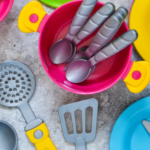RESOURCES
Big Idea: Plastic
 Plastic is a perfect Big Idea to start your CBL because it is a complex topic that spans science, history, politics, economics, and human behavior. While we are learning more and more that plastic is bad for the environment and our health, it is still ubiquitous in almost everyone’s daily life. From computers, cars and lightweight packaging that has made the safe transfer of food possible, plastics have benefited our daily lives. Plastic has made our lives better and worse at the same time.
Plastic is a perfect Big Idea to start your CBL because it is a complex topic that spans science, history, politics, economics, and human behavior. While we are learning more and more that plastic is bad for the environment and our health, it is still ubiquitous in almost everyone’s daily life. From computers, cars and lightweight packaging that has made the safe transfer of food possible, plastics have benefited our daily lives. Plastic has made our lives better and worse at the same time.
Many of us do not think twice about how much plastic we use, directly and indirectly. And, for those who see the problem, there is a struggle to identify meaningful ways to make a difference.
Starting from the initial Challenge: Eliminate/Mitigate the negative impact of plastic!, Investigate deeply to understand the issue from a wide range of perspectives fully. There is a desperate need for creative and innovative thinking resulting in local and global solutions. Refine the Challenge to something contextual and actionable based on your new findings. Then start digging and thinking to develop sustainable solutions that move the needle.
Plastic is a Big Idea that will take deep thinking and learning to find solutions. So let’s get started as our health and the health of our planet depends on it.
ENGAGE
Big Idea: Plastic
Essential Question: How do we eliminate the negative impact of plastic?
Challenge: Eliminate/Mitigate the negative impact of plastic!
Sample Guiding Questions
These are only example questions we encourage you to ask as many personal and contextual questions as possible.
- What is plastic?
- What are the ingredients in plastic?
- Where do we find plastics in our daily lives?
- What are the problems with plastic?
- What are the benefits of plastic?
- Why do we use so much plastic?
- What is the history of plastic development and use?
- What are the substitutes for plastic?
- Where does used plastic ends up?
- Does recycling work?
- Etc.
*Once you brainstorm all of the questions organize and prioritize them to prepare for an efficient and effective Investigation.
INVESTIGATE
Guiding Activities and Resources
These are only a set of example activities and resources and the learners will need to evaluate the quality of the content. They are not verified or necessarily supported, just examples. The ones that you choose should be in direct relationship to your specific guiding questions and context. Activities and resources for adults, adolescents, and younger children will be different. The goal is to develop solutions that mean something in your community and are sustainable.
Example Activities
- Starting with the Guiding Resources below develop a foundational understandign of the science, history, economics and politics of Plastics. Avoid jumping to conclusions and only supporting your opinions. Embrace the complexity and work to develop a braod view of the Big Idea and Challenge.
- Complete a personal inventory of where you use plastic in your daily life. Using your inventory explore possible options for replacing plastic. Consider what causes a barrier (habit, no options, health codes, etc.)
- Explore different industries (technology, health care, automotive, etc.) and learn how and where plastic is used. Consider the costs and benefits.
- Trace the lifecycle of plastic from the original ingredients to disposal.
- Identify the primary manufacturers of plastic are and find out what they are doing to protect people and the environment.
- Explore how plastic is used in your school and identiify if there are any policies or plans in place to replace, reduce or recycle.
- Research the effectiveness of recycling in your community.
- etc.
Example Resources
- History and Future of Plastics – https://www.sciencehistory.org/the-history-and-future-of-plastics
- Politics and the plastic crisis: A review throughout the plastic life cycle – https://wires.onlinelibrary.wiley.com/doi/full/10.1002/wene.360
- The Plastic Problem – https://www.nationalgeographic.org/lesson/plastic-problem/
- The Problems with Plastics – https://www.publichealthpost.org/research/problems-with-plastics/
- The Benefits of Plastic – https://cei.org/studies/the-immeasurable-benefits-of-plastics-to-humanity/
- The New Plastics Economy – https://www3.weforum.org/docs/WEF_The_New_Plastics_Economy.pdf
- Recycling Plastic Does Not Work – https://www.theatlantic.com/ideas/archive/2022/05/single-use-plastic-chemical-recycling-disposal/661141/
Synthesis
Using the research findings from your Investigations develop a synthesis that demonstrates a clear understanding of the challenge. For help with creating a synthesis explore this resource.
Solution Prototypes – Using your research synthesis create multiple ideas for solutions and review each one to make sure your research supports it. Share the prototypes with various stakeholders and get feedback.
Solution – with the feedback from the stakeholders develop one solution that has the most potential for success.
ACT
Implement – Develop a plan to implement the solution with the stakeholders and collect data about the impact.
Evaluate – Using quantitative and qualitative measures determine if the solution is valid and what can be improved.
REFLECT, DOCUMENT, AND SHARE
Throughout the experience take time to document the events and reflect on what is happening to build on prior knowledge and identify future questions.
Share what you learned with your local community and the world. Use #challengebasedlearning on social media.
